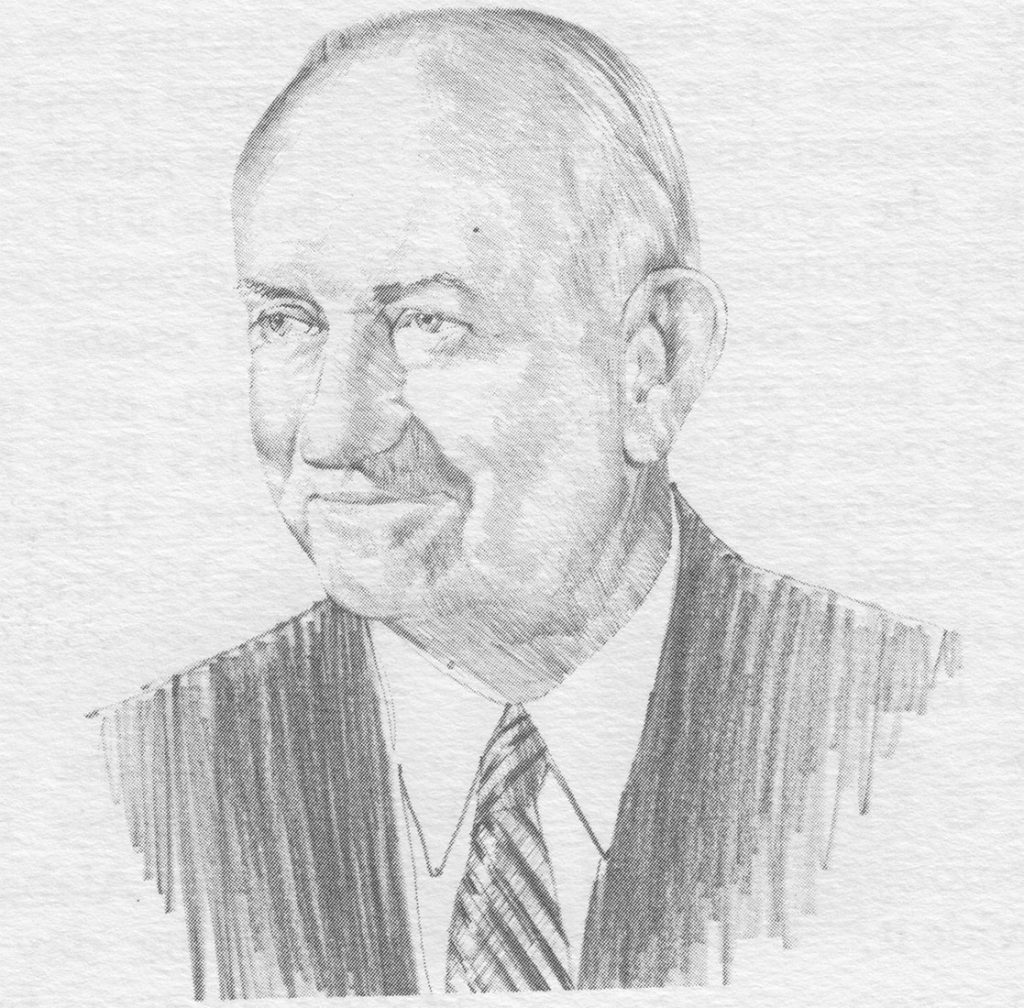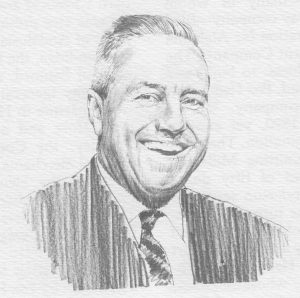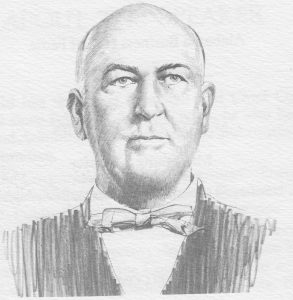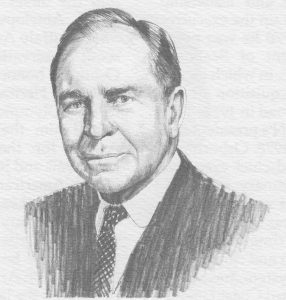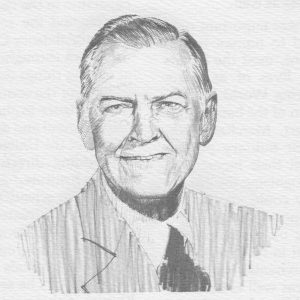John Finley McRae began his remarkable career at the age of eighteen on the lowest rung of the professional ladder of the smallest bank in Mobile. When he retired fifty-four years later, he was chairman of the board of that same bank, and the institution itself Merchants National had become one of the most prestigious financial organizations in the state. The young man and the young bank, it could be said, matured side by side, and together they became two of the most valuable assets of the port city of Mobile.
Born in Montgomery shortly before the turn of the· century, Finley McRae was the son of a Baptist minister, the Reverend George W. McRae, who, in 1907, moved his family to Mobile. There young McRae attended public schools and graduated from Barton Academy in 1913. He then enrolled in Birmingham’s Howard College, but after three semesters, because of his parents’ illness and the depletion of his financial resources, he returned home to find a job.
In February 1915, he accepted a position as runner and stenographer with Merchants Bank of Mobile, then in its thirteenth year of operation. Mr. Ernest F. Ladd, who was made president of the bank that same year, saw much promise in his young employee and encouraged him to learn the banking business. McRae had ideas along those lines himself, and during the next three years, he worked in all departments of the bank and rose to the position of auditor. With the advent of World War I, however, McRae left to join the army. When the war ended, he returned to the bank, and by 1919 he was an assistant cashier.
As the bank grew during the next decade, so did the contributions of Finley McRae. Guided by his friend and mentor Ernest Ladd, McRae began to take a leading hand in the ‘s affairs. Recognizing the importance of the Port of Mobile to the community and to the bank, McRae organized a foreign department. He traveled throughout the southeast and midwest in search of trade business, learned to speak Spanish so that he might communicate better with his South American business associates, and succeeded in establishing a department that was for many years the only fully-organized Foreign Department in a bank between New Orleans and Baltimore.
By 1929, Merchants Bank of Mobile had become Merchants National Bank, with a brand new eighteen-story building, and Finley McRae had become vice president. Under Ernest Ladd’s leadership, Merchants National survived the difficult depression years and emerged larger and stronger than before. Between 1930 and 1940, deposits rose from $12 million to $40 million, and during those same years, McRae’s role in the bank’s affairs expanded at a similar rate. In 1935 he became a director; in 1937, executive vice president; and in 1941, when Ernest Ladd died unexpectedly, Finley McRae succeeded him as president.
Not long after he assumed office, the new president made a compact with the official staff: If they would never refer to him as “boss,” he, in turn, would never fail them in courtesy. That belief in a congenial, cooperative working environment became the hallmark of McRae’s tenure as chief executive, and under his guidance Merchants National became known not only as an important financial institution but as a pleasant place to work and to do business as well.
Believing that money was important only insofar as it contributed to human happiness, McRae, as president, used the bank’s resources to better the lives of as many people as he could. During World War II, when a significant portion of the bank’s staff left to join the war effort, Merchants National supplemented their military pay so that they could maintain their incomes at pre-induction levels. Recognizing the important role the oil industry could play in improving the region’s economy, McRae and his staff began financing oil production in Louisiana and Mississippi in the late 1940s. As a consequence, Merchants National’s Petroleum Department was well established and ready to serve Mobile when oil was discovered at nearby Citronelle in 1955.
During the almost quarter of a century of Finley McRae’s presidency, Merchants National continued to expand. It was improved services, however, and not expansion in and of itself that McRae sought, for the true worth of a bank, he often said, was measured by its usefulness rather than by its size. To improve its usefulness to the community, then, Merchants National entered the branch banking field in 1955, when a law permitting branch banking in Mobile County was passed, and that same year the bank also began enlarging and renovating its downtown quarters. Perhaps the most significant step toward improving services came in 1959, however, when Merchants National became the first bank in Alabama, and among the first in the South, to install electronic data processing equipment. The move enabled the bank to introduce “no passbook savings” to Mobile and to improve many of its other customer services.
Finley McRae’s reputation as a respected banker with a broad knowledge of financial affairs prompted many business and industrial corporations to call upon his services as a director. In that capacity, he served some of the largest corporations in Alabama, including Waterman Steamship Corporation, American Liberty Insurance Company of Birmingham, Gulf, Mobile and Ohio Railroad Company, Alabama Dry Dock and Shipbuilding Company, Southern Industries Corporation, International Paper Company, Alabama Power Company, and United Gas Corporation. McRae also served in important advisory and directional capacities in the Federal Reserve System and represented the southeastern states on the Federal Advisory Council.
Known throughout his life for his “genius at getting things done” and for his energetic support of the community, McRae became a central figure in the civic life of Mobile. He helped found and served for many years as a trustee of the United Fund of Mobile; he was a founding director of the Southern Research Institute, a non-profit corporation devoted to scientific research; he served on the board of trustees of the Mobile Infirmary for several decades during which the institution became one of the largest and best-equipped hospitals in the South; and from 1955 to 1957, he served as chairman of the Rhodes Scholarship Selection Committee for the State of Alabama.
An avid sports fan, McRae was a founding director of the Mobile Touch down Club, which developed a county-wide athletic program for Mobile’s youth. He was also chairman of the board of trustees of the Ernest F. Ladd Memorial Stadium Corporation, president of the Mobile Arts and Sports Association, and president of the Senior Bowl Association. (Without McRae, noted the Mobile Press-Register, “there would be no Ladd Stadium and no Senior Bowl.”)
McRae’s many contributions to the region were publicly acknowledged in 1955, when the Chamber of Commerce named him Mobilian of the Year, and again in 1963 when Spring Hill College awarded him an honorary doctorate. Finley McRae, said the college’s trustees, is a “most exemplary” citizen, a man whose “free-reined energy, breadth of vision, integrity of character, and dedication to Christian ethical ideals … led him to a position of respect and responsibility unique in this region . . . His service on behalf of his fellow citizens has been generous. His faith in the future of this region is firm.” And, the trustees concluded, as did the people of Mobile, that every citizen in the port city “is better off because of his presence in our midst.”

